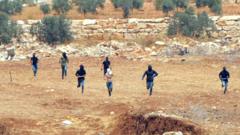Ordinary Iranians, once hopeful for a quick resolution to the conflict with Israel, are now facing a grim reality as violent strikes persist. Their daily lives are overshadowed by the threat of further violence and ineffective government responses, leaving many feeling hopeless.
Iranian Citizens Confront Uncertainty Amid Escalating Conflict with Israel

Iranian Citizens Confront Uncertainty Amid Escalating Conflict with Israel
As the violence between Israel and Iran intensifies, residents of Tehran grapple with fear and uncertainty, reflecting on the ongoing repercussions of conflict.
In the latest developments of the ongoing conflict between Israel and Iran, residents of Tehran are expressing growing fears as missile strikes and air raids become a harrowing reality. Once thought to be a fleeting crisis, the situation is now appearing increasingly dire, with citizens conveying their anxiety through voice notes to reporters from The New York Times.
Behzad, a 40-year-old copyright expert, shared chilling images from the rooftop of her home, where she witnessed a devastating explosion at a nearby fuel depot. “The glow of the blast lit up the mountains,” she recalled, marking her first firsthand encounter with such violence in her lifetime.
Ali, a 43-year-old engineer, described how the initial shock of the attacks quickly transformed into a state of constant vigilance for him and his family. “On the first night, it seemed temporary, but by the second, we were barely able to sleep,” he revealed, expressing concern for the well-being of his young children. “We try to avoid any mention of war so they don’t sense our fear.”
The conflict has sparked a wave of doubt regarding Iran’s political leadership and their handling of ongoing crises. With negotiations with the United States canceled, hopes for a peaceful resolution have diminished, casting a shadow over families who are directly feeling the impacts of the conflict.
Psychologist Arash acknowledged that citizens appear to be waking up to the realization that the current situation differs drastically from previous confrontations. “In the past, we experienced short-lived strikes, but this wave feels more sustained,” he said. “People are increasingly feeling that life is on pause.”
As internet restrictions tighten, access to information about the strikes has also become a challenge for some Tehranians. Many are resorting to using VPNs to navigate around these limitations, desperate for updates in this rapidly evolving situation.
Feelings of discontent are palpable among the populace, with some Iranians expressing anger towards their own government, linking the current violence back to past economic mismanagement that had left the nation vulnerable before the conflict. Teacher Sepideh highlighted discontent among citizens celebrated amidst the chaos, suggesting that some believe such attacks could lead to liberation, even at a steep price for national resources.
As the situation develops, the resilience and hope of the Iranian people face a stark test against the backdrop of an escalating conflict that shows no signs of abating anytime soon.
Behzad, a 40-year-old copyright expert, shared chilling images from the rooftop of her home, where she witnessed a devastating explosion at a nearby fuel depot. “The glow of the blast lit up the mountains,” she recalled, marking her first firsthand encounter with such violence in her lifetime.
Ali, a 43-year-old engineer, described how the initial shock of the attacks quickly transformed into a state of constant vigilance for him and his family. “On the first night, it seemed temporary, but by the second, we were barely able to sleep,” he revealed, expressing concern for the well-being of his young children. “We try to avoid any mention of war so they don’t sense our fear.”
The conflict has sparked a wave of doubt regarding Iran’s political leadership and their handling of ongoing crises. With negotiations with the United States canceled, hopes for a peaceful resolution have diminished, casting a shadow over families who are directly feeling the impacts of the conflict.
Psychologist Arash acknowledged that citizens appear to be waking up to the realization that the current situation differs drastically from previous confrontations. “In the past, we experienced short-lived strikes, but this wave feels more sustained,” he said. “People are increasingly feeling that life is on pause.”
As internet restrictions tighten, access to information about the strikes has also become a challenge for some Tehranians. Many are resorting to using VPNs to navigate around these limitations, desperate for updates in this rapidly evolving situation.
Feelings of discontent are palpable among the populace, with some Iranians expressing anger towards their own government, linking the current violence back to past economic mismanagement that had left the nation vulnerable before the conflict. Teacher Sepideh highlighted discontent among citizens celebrated amidst the chaos, suggesting that some believe such attacks could lead to liberation, even at a steep price for national resources.
As the situation develops, the resilience and hope of the Iranian people face a stark test against the backdrop of an escalating conflict that shows no signs of abating anytime soon.




















